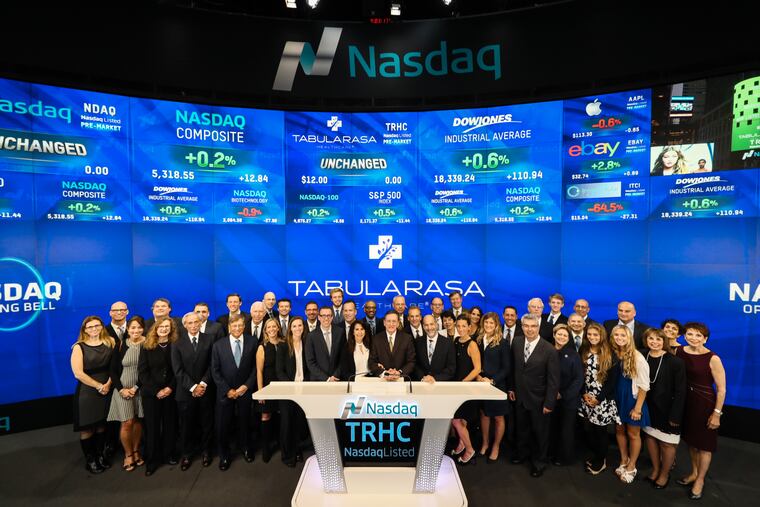Former skeptic turns bullish on Tabula Rasa, the Philly-area health-care tech firm
Tabula Rasa Healthcare, a Moorestown firm that builds and buys systems for keeping patients on their meds and in their homes longer, is one of the hot, volatile stocks competing for Medicare and Medicaid patients.

Tabula Rasa, the Moorestown drug-program manager that went public with an initial stock offering in 2016, was one of the Philadelphia area’s hottest stocks over the next two years, rising from an initial $14 a share to over $80 last September, and topping the Standard & Poor’s 600 small-cap stocks for last year.
But medical-stock watchers, including David Grossman at Stifel Financial, warned the stock was overheated. Sales for the 1,000-person company topped $200 million last year, up 44 percent, but Tabula Rasa posted a loss of $47 million after spending heavily on acquisitions and research.
By May, the stock had lost nearly half its value, trading in the low $40s before rebounding to the $50s recently.
Now Grossman is betting it’s time to buy Tabula Rasa, he told clients in a report Friday.
“This is a small company in the early stages of its growth path,” and investors should expect its share price to bounce around, Grossman wrote. But he believes the trends boosting Tabula Rasa and other digital medical-services companies are strong and relatively immune from “political health-care debate” over the fate of Obamacare or drug-price caps.
These firms offer “medication therapy management,” a service mandated by Medicare and some Medicaid programs and the fast-growing PACE program for chronically ill home patients, to identify patients at risk of misdosing or going off their medicines and get them help taking their medicines, thereby cutting costs.
Tabula Rasa, started and run by serial Philadelphia medical entrepreneur Dr. Calvin Knowlton — and backed by investors including Radius Ventures, the New Jersey Economic Development Authority, and Bruce Leuhrs’ Rittenhouse Ventures — seeks to automate drug management by building, buying, and consolidating systems that make it easier to monitor patients from a distance.
The company used investor cash to buy SinfoniaRx in 2017, boosting its market share to around 20%. Tabula Rasa put Sinfonia boss Kevin Boesen in charge of building a national sales force — a gamble Grossman expects will help the company further boost its market share.
The analyst sees a few “potential catalysts” likely to boost profits through next year:
Medicare and Medicaid metrics show Tabula Rasa has been able to meet government-targeted cost savings, which some of its rivals haven’t. The cost savings will make it easier for Tabula Rasa to be hired by managed Medicaid and commercial insurance plans, expanding beyond Medicare.
Another Tabula Rasa acquisition, PrescribeWellness, gives the company 10,000 new community pharmacy clients who use the acquired company’s software to track patients. Grossman says that will make it much easier to sell Tabula Rasa’s Medicare and Medicaid services to pharmacy clients and to call on the pharmacists for “local follow-up and support” for patients who are tough to serve through Tabula Rasa’s call center.
Sales chief Boesen has hired 12 national salespeople and plans to add more to target his former firm’s Managed Medicaid and Medicare Advantage insurer clients.
The rapid growth of for-profit hospice care, which now cover three-quarters of all hospice patients, has put pressure on hospices to control costs through platforms like Tabula Rasa, opening new markets.
What could go wrong? Tabula Rasa and its rivals have based a lot of their growth plans on federal Center for Medicare and Medicaid Services guidelines, which could change, Grossman warns.
He also notes that building a sales force is inherently risky. “It feels like they are doing the right things,” but Tabula Rasa is bracing for much higher costs — and continued losses — as it hires more sales and sales-support people over the next couple of years.
And, Grossman reiterated, there are always “risks associated with a small-capitalization growth company” in a competitive new business, with volatile short-term sales and profits and acquisition costs.